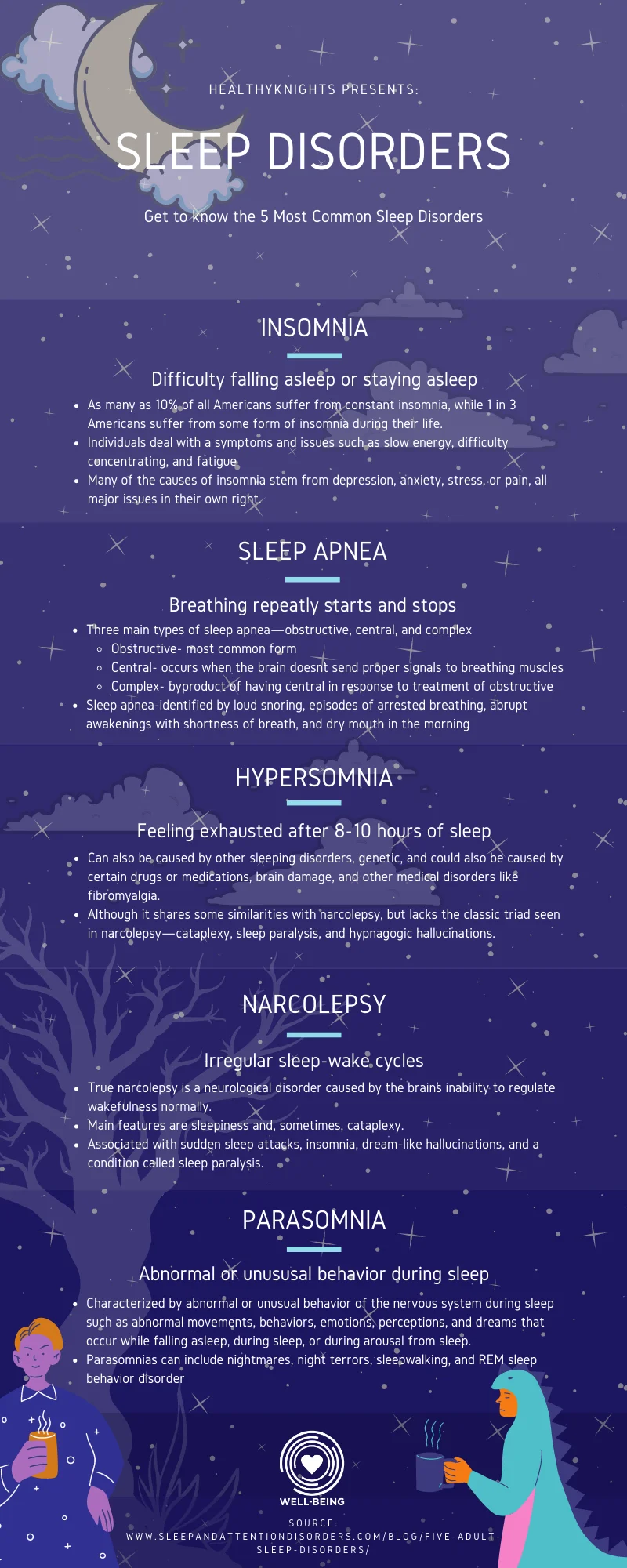What are the signs and symptoms of common sleep disorders?


Sleep disorders are a common problem that affects millions of people worldwide. These disorders can have a significant impact on a person’s overall health and well-being. In this article, we will explore the signs and symptoms of some of the most common sleep disorders, including insomnia, sleep apnea, restless leg syndrome, narcolepsy, circadian rhythm disorders, sleep deprivation, snoring, and sleepwalking.
Insomnia:
Insomnia is a sleep disorder characterized by difficulty falling asleep, staying asleep, or both. Some common signs and symptoms of insomnia include:
1. Difficulty falling asleep at night
2. Waking up frequently during the night
3. Waking up too early in the morning
4. Feeling tired upon waking
5. Daytime sleepiness or fatigue
6. Difficulty concentrating or focusing during the day
7. Irritability or mood disturbances
Sleep Apnea:
Sleep apnea is a sleep disorder in which a person’s breathing is repeatedly interrupted during sleep. Some signs and symptoms of sleep apnea include:
1. Loud and chronic snoring
2. Episodes of breathing cessation during sleep, often witnessed by a partner
3. Gasping or choking during sleep
4. Excessive daytime sleepiness or fatigue
5. Morning headaches
6. Difficulty staying asleep
7. Waking up with a dry mouth or sore throat
Restless Leg Syndrome:
Restless leg syndrome (RLS) is a neurological disorder characterized by an irresistible urge to move the legs, often accompanied by uncomfortable sensations. Some signs and symptoms of restless leg syndrome include:
1. Uncomfortable sensations in the legs, such as itching, tingling, or crawling
2. Strong urge to move the legs, especially when at rest or lying down
3. Relief from symptoms with movement or stretching
4. Symptoms that worsen in the evening or at night
5. Difficulty falling asleep or staying asleep due to leg discomfort
Narcolepsy:
Narcolepsy is a neurological disorder that affects the brain’s ability to regulate sleep-wake cycles. Some signs and symptoms of narcolepsy include:
1. Excessive daytime sleepiness, often resulting in unintentional napping or falling asleep at inappropriate times
2. Sudden loss of muscle tone (cataplexy) triggered by strong emotions
3. Sleep paralysis, which is the temporary inability to move or speak while falling asleep or waking up
4. Vivid hallucinations while falling asleep or waking up
5. Fragmented nighttime sleep with frequent awakenings
Circadian Rhythm Disorders:
Circadian rhythm disorders are disruptions in the body’s internal clock, which regulates sleep-wake cycles. Some signs and symptoms of circadian rhythm disorders include:
1. Difficulty falling asleep or staying asleep at the desired time
2. Excessive daytime sleepiness or fatigue
3. Irregular sleep patterns, such as sleeping during the day and being awake at night
4. Difficulty adjusting to shift work or time zone changes
5. Impaired concentration or performance due to sleep disturbances
Sleep Deprivation:
Sleep deprivation occurs when an individual does not get enough sleep on a regular basis. Some signs and symptoms of sleep deprivation include:
1. Excessive daytime sleepiness or fatigue
2. Difficulty concentrating or focusing
3. Mood disturbances, such as irritability or depression
4. Impaired memory or cognitive function
5. Increased risk of accidents or errors
6. Weakened immune system
7. Weight gain or difficulty losing weight
Snoring:
Snoring is a common sleep disorder characterized by noisy breathing during sleep. While snoring itself may not be a serious condition, it can be a sign of underlying sleep apnea. Some signs and symptoms of snoring include:
1. Loud and chronic snoring
2. Gasping or choking sounds during sleep
3. Restless sleep
4. Daytime sleepiness or fatigue
5. Morning headaches
6. Waking up with a dry mouth or sore throat
Sleepwalking:
Sleepwalking, also known as somnambulism, is a sleep disorder characterized by complex behaviors performed during sleep. Some signs and symptoms of sleepwalking include:
1. Getting out of bed and walking around while still asleep
2. Performing routine activities, such as dressing or eating, while asleep
3. Having a blank or glassy-eyed expression
4. Difficulty waking up during an episode
5. No memory of the sleepwalking episode upon waking
In conclusion, sleep disorders can have a significant impact on a person’s quality of life. It is important to recognize the signs and symptoms of these disorders in order to seek appropriate treatment. If you or someone you know is experiencing any of the signs and symptoms mentioned above, it is recommended to consult a healthcare professional for further evaluation and guidance.
Recent Posts
How do I create an engaging and informative online quiz or assessment?
Creating an engaging and informative online quiz or assessment can be a powerful tool for… Read More
What are the most effective methods for managing and reducing work-related stress in the hospitality industry?
Work-related stress is a common issue in the hospitality industry, where employees often face long… Read More
How can I improve my assertiveness and communication skills in a leadership position?
In a leadership position, assertiveness and effective communication skills are crucial for success. Being able… Read More
What are the key elements of a successful employee recognition and rewards program?
Employee recognition and rewards programs play a crucial role in motivating and engaging employees, as… Read More
How do I effectively manage and respond to customer feedback and reviews?
Customer feedback and online reviews play a crucial role in shaping a company's reputation and… Read More
What are the best strategies for effective time management as a stay-at-home parent?
Effective time management is crucial for stay-at-home parents who juggle multiple responsibilities on a daily… Read More